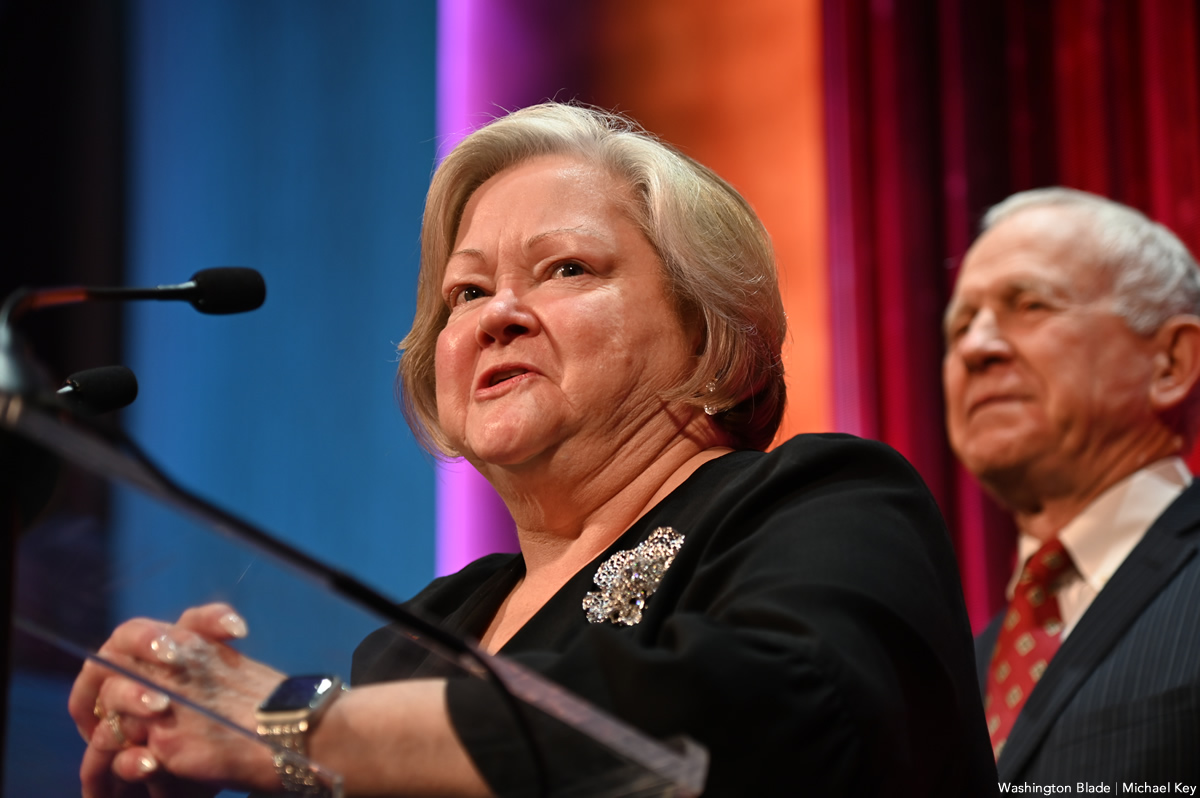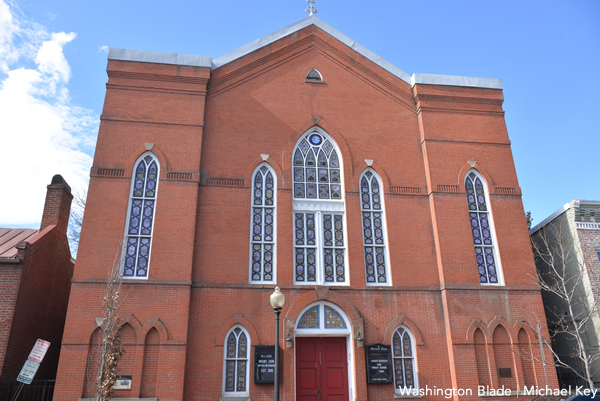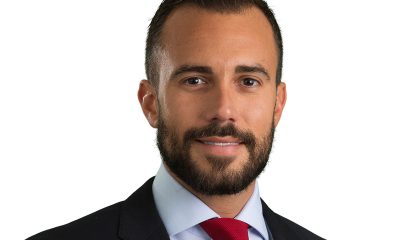National
Gay advocates assail Obama’s Justice Department
Claim administration misrepresented views in ‘Don’t Ask’ brief
Experts on “Don’t Ask, Don’t Tell” are lambasting the Justice Department, claiming the administration misrepresented their views in a legal brief aimed at thwarting a court challenge to the ban on open service.
Nathaniel Frank, a senior fellow at the Palm Center, a think tank at the University of California, Santa Barbara, said the Obama administration mischaracterized his views on the impact that open service would have on privacy issues.
“The way they portrayed me is preposterous and I’m not sure that any person in good faith hearing what I had to say could conclude what the [Department of Justice] concluded in their [request for] summary judgment,” he said. “I specifically said having a concern about privacy is not irrational, but using that privacy concern as an argument for the need to ban gays is irrational.”
Aaron Belkin, director of the Palm Center, similarly claimed the Justice Department misrepresented what he said in depositions about privacy arguments, and even went so far as to say the Obama administration lawyers weren’t being truthful.
“They completely misrepresented my statement in the deposition,” Belkin said. “They were not being truthful about my statement because they said that I claimed that there is a rational basis for the privacy arguments, and I claimed no such thing.”
In a request for summary judgment released earlier this week, the Justice Department names Frank and Belkin as among the experts on “Don’t Ask, Don’t Tell” who gave depositions in the case of Log Cabin v. United States. The lawsuit seeks to overturn the ban on the basis that it infringes upon the First Amendment rights of LGBT service members.
Both Frank and Belkin were questioned during deposition about whether privacy concerns for service members constituted a rational basis for the enactment of “Don’t Ask, Don’t Tell” in 1993.
The brief says Frank “acknowledged” during his deposition that “privacy concerns such as those on which Congress relied were not irrational.” But Frank disputed this characterization, pointing to his remarks during deposition.
According to an excerpt of the deposition obtained by DC Agenda, Frank was asked about privacy issues in the context of whether former Chairman of the Joint Chiefs of Staff Gen. Colin Powell’s statement in 1993 that service members “are required to live in communal settings that force intimacy and provide little privacy” was based on professional military judgment.
Frank replied that Powell — whose position has since evolved to endorse the Pentagon’s process for repealing the law — may have had concerns with privacy as a general matter based on professional judgment, but said Powell’s statement doesn’t “constitute an argument for keeping out open homosexuals.”
“Because what he says here is that service members are required to serve with very little privacy, so it doesn’t make any sense to me to conclude from that that there is a justification to exclude open homosexuals since he’s just acknowledged that part of being in the military means sacrificing privacy,” Frank said in his deposition.
It’s for this reason that Frank is now saying the Justice Department misrepresented his views in the brief against the lawsuit.
“So I really said the opposite of what the DOJ motion claims,” he said. “I made very clear that I would not call those feelings [about privacy] irrational, but nor would I call it rational to use that feeling as a legitimate basis for excluding a whole group of people. And that’s all there in the record.”
Belkin similarly cried foul, claiming the Justice Department mischaracterized his deposition in the brief. The administration says that Belkin testified that “the privacy basis is rational in circumstances such as combat where private accommodations are not possible.”
“Dr. Belkin studied the experience of the Israeli military and found that heterosexual concern about privacy necessitated, in certain instances, separate accommodations or work arrangements for heterosexual service members,” says the brief. “Dr. Belkin also acknowledged similar findings with respect to Congress’ concern regarding sexual tension within the military.”
According to the brief, Belkin also “pointedly admitted” people in the military have sex with each other, and some service members have “sex with other members of the same sex.”
But Belkin said the Justice Department’s account of his deposition and his alleged acknowledgement of a rational basis for privacy concerns was completely off the mark.
“People who defend ‘Don’t Ask, Don’t Tell’ for almost 20 years have been confusing up with down and left with right,” he said. “If the Obama administration lawyers think that my remarks in any way constitute an acknowledgement of the rational basis for the privacy rationale, then they need a new legal team.”
Belkin said the Justice Department neglected to mention major points about his deposition. He said he brought up men having sex with other men because he believes straight men would be having sex with men in the military regardless of the ban.
“Think for a minute about prisons,” he said. “It’s not exactly the same, but the point is not that gays are responsible for gay sex, but a lot of people have same-sex sex in the military and the privacy rationale does not take that into account. The privacy rationale is premised on the assumption that it’s only gays who having sex, so you have to get rid of the gays if you want to get rid of that kind of thing.”
Belkin also said the Justice Department misconstrued his take on there being a rational basis for “Don’t Ask, Don’t Tell” because some straight service members are uncomfortable around gay service members.
“It’s absolutely true that some heterosexual service members are uncomfortable in front of gay service members, but that in no way constitutes a rational basis for the privacy rationale because gays and lesbians are already serving with straight service members — and the conditions in the barracks and the showers are not going to change after the repeal of the ban,” he said.
The Justice Department didn’t respond to a request for comment on Frank and Belkin’s assertions that they were mischaracterized in the brief.
Frank also took issue with the Justice Department’s repeated references to experts on “Don’t Ask, Don’t Tell” with the use of quotation marks.
For example, the brief says in a footnote that “LCR’s ‘experts’ ultimately seek to challenge the wisdom of the DADT policy, a challenge that is irrelevant under rational basis review.”
Frank said the repeated reference to experts in quotation marks is “highly unusual” for the Justice Department and “may have gone too far.”
“That’s a favorite tactic of the religious right to polish their anti-intellectual credentials, and make it seem like there’s no such things as a homosexual, so they’ll put homosexual in quotes,” he said.
The Obama administration defense of the “Don’t Ask, Don’t Tell” statute against the challenge from Log Cabin is causing consternation among advocacy groups seeking to repeal the law.
Joe Solmonese, president of the Human Rights Campaign, said “we took a step backward” with the Justice Department brief in the move to repeal “Don’t Ask, Don’t Tell” and that the brief “relies on arguments that were debunked and discredited in 1993, and even more so now.”
Solmonese also called on the administration to “show leadership, move the debate forward, and work with Congress to get repeal done” this year.
“While the Pentagon undertakes its review of how to implement repeal, Congress can and must move forward in repealing DADT in the same bill that put it into law more than 17 years ago — the defense authorization act,” he said. “And the president can and must provide the leadership necessary to get the law passed this year.”
Aubrey Sarvis, executive director of the Servicemembers Legal Defense Network, expressed similar disappointment in a statement responding to the brief.
“SLDN understands the Justice Department’s role in defending the constitutionality of federal laws, even ones with which its leaders do not agree,” Sarvis said. “However, there continues to be a big and unnecessary disconnect between what DOJ files in court and what the president says on Capitol Hill and to his top [Department of Defense] leadership team.”
Sarvis said he wants the White House to make clear to Congress that “Don’t Ask, Don’t Tell” is a priority this year for President Obama and for the president to include repeal language in budget language headed to Capitol Hill in the coming weeks.
“The president’s defense budget repeal language should mirror the words in his State of the Union speech to Congress and the American people,” Sarvis said.
In a statement, Tracy Schmaler, spokesperson for the Justice Department, said the administration is defending “Don’t Ask, Don’t Tell” as “it traditionally does when acts of Congress are challenged.”
“The department does not pick and choose which federal laws it will defend based on any one administration’s policy preferences,” she said.
Schmaler said Obama disagrees with the underlying judgments Congress used to pass “Don’t Ask, Don’t Tell,” and noted that the president “believes and has repeatedly affirmed that [‘Don’t Ask, Don’t Tell’] is a bad policy that harms our national security and undermines our military effectiveness.”
“The president and his administration are working with the military leadership and Congress to repeal this discriminatory [law],” she said.
The White House
Judy Shepard to receive Presidential Medal of Freedom
Nancy Pelosi is also among this year’s honorees

Beloved LGBTQ advocate Judy Shepard is among the 19 honorees who will receive the Presidential Medal of Freedom, the highest civilian award in the U.S., the White House announced on Friday.
The mother of Matthew Shepard, who was killed in 1998 in the country’s most notorious anti-gay hate crime, she co-founded the Matthew Shepard Foundation with her husband Dennis to raise awareness about anti-LGBTQ violence.
The organization runs education, outreach, and advocacy programs, many focused on schools.
Shepard was instrumental in working with then-President Barack Obama for passage of the landmark Matthew Shepard and James Byrd Jr. Hate Crimes Prevention Act in 2009, which was led in the House by then-Speaker Nancy Pelosi (D-Calif.), who will also be honored with a Presidential Medal of Freedom during the ceremony on Friday.
Also in 2009, Shepard published a memoir, “The Meaning of Matthew: My Son’s Murder in Laramie, and a World Transformed,” and was honored with the Black Tie Dinner Elizabeth Birch Equality Award.
Other awardees who will be honored by the White House this year are: Actor Michelle Yeoh, entrepreneur and former New York Mayor Michael Bloomberg, Jesuit Catholic priest Gregory Boyle, Assistant House Democratic Leader Jim Clyburn (D-S.C.), former Labor and Education Secretary and former U.S. Sen. Elizabeth Dole (R-N.C.), journalist and former daytime talkshow host Phil Donahue, World War II veteran and civil rights activist Medgar Evers (posthumous), former Vice President Al Gore, civil rights activist and lawyer Clarence B. Jones, former Secretary of State and U.S. Sen. John Kerry (D-Mass.), former U.S. Sen. Frank Lautenberg (D-N.J.) (posthumous), Olympic swimmer Katie Ledecky, educator and activist Opal Lee, astronaut and former director of NASA’s Johnson Space Center Ellen Ochoa, astronomer Jane Rigby, United Farm Workers President Teresa Romero, and Olympic athlete Jim Thorpe (posthumous).
National
United Methodist Church removes 40-year ban on gay clergy
Delegates also voted for other LGBTQ-inclusive measures

The United Methodist Church on Wednesday removed a ban on gay clergy that was in place for more than 40 years, voting to also allow LGBTQ weddings and end prohibitions on the use of United Methodist funds to “promote acceptance of homosexuality.”
Overturning the policy forbidding the church from ordaining “self-avowed practicing homosexuals” effectively formalized a practice that had caused an estimated quarter of U.S. congregations to leave the church.
The New York Times notes additional votes “affirming L.G.B.T.Q. inclusion in the church are expected before the meeting adjourns on Friday.” Wednesday’s measures were passed overwhelmingly and without debate. Delegates met in Charlotte, N.C.
According to the church’s General Council on Finance and Administration, there were 5,424,175 members in the U.S. in 2022 with an estimated global membership approaching 10 million.
The Times notes that other matters of business last week included a “regionalization” plan, which gave autonomy to different regions such that they can establish their own rules on matters including issues of sexuality — about which international factions are likelier to have more conservative views.
Rev. Kipp Nelson of St. Johns’s on the Lake Methodist Church in Miami shared a statement praising the new developments:
“It is a glorious day in the United Methodist Church. As a worldwide denomination, we have now publicly proclaimed the boundless love of God and finally slung open the doors of our church so that all people, no matter their identities or orientations, may pursue the calling of their hearts.
“Truly, all are loved and belong here among us. I am honored to serve as a pastor in the United Methodist Church for such a time as this, for our future is bright and filled with hope. Praise be, praise be.”
Federal Government
Republican state AGs challenge Biden administration’s revised Title IX policies
New rules protect LGBTQ students from discrimination

Four Republicans state attorneys general have sued the Biden-Harris administration over the U.S. Department of Education’s new Title IX policies that were finalized April 19 and carry anti-discrimination protections for LGBTQ students in public schools.
The lawsuit filed on Tuesday, which is led by the attorneys general of Kentucky and Tennessee, follows a pair of legal challenges from nine Republican states on Monday — all contesting the administration’s interpretation that sex-based discrimination under the statute also covers that which is based on the victim’s sexual orientation or gender identity.
The administration also rolled back Trump-era rules governing how schools must respond to allegations of sexual harassment and sexual assault, which were widely perceived as biased in favor of the interests of those who are accused.
“The U.S. Department of Education has no authority to let boys into girls’ locker rooms,” Tennessee Attorney General Jonathan Skrmetti said in a statement. “In the decades since its adoption, Title IX has been universally understood to protect the privacy and safety of women in private spaces like locker rooms and bathrooms.”
“Florida is suing the Biden administration over its unlawful Title IX changes,” Florida Gov. Ron DeSantis wrote on social media. “Biden is abusing his constitutional authority to push an ideological agenda that harms women and girls and conflicts with the truth.”
After announcing the finalization of the department’s new rules, Education Secretary Miguel Cardona told reporters, “These regulations make it crystal clear that everyone can access schools that are safe, welcoming and that respect their rights.”
The new rule does not provide guidance on whether schools must allow transgender students to play on sports teams corresponding with their gender identity to comply with Title IX, a question that is addressed in a separate rule proposed by the agency in April.
LGBTQ and civil rights advocacy groups praised the changes. Lambda Legal issued a statement arguing the new rule “protects LGBTQ+ students from discrimination and other abuse,” adding that it “appropriately underscores that Title IX’s civil rights protections clearly cover LGBTQ+ students, as well as survivors and pregnant and parenting students across race and gender identity.”




















